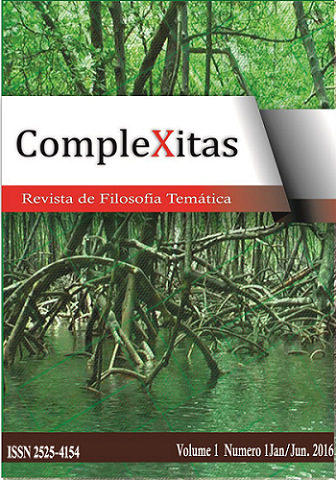TOWARDS A PHILOSOPHY OF HUMAN TECHNOLOGY: Outlook on cognitive enhancements in Avatar/ Virtual Reality schizophrenia therapy
DOI:
https://doi.org/10.18542/complexitas.v1i1.3418Palavras-chave:
Philosophy of Technology. Human Technology interfaces. Avatar schizophrenia therapy. Ethics of Cognitive Enhancement.Resumo
This article hinges on a complex and interdisciplinary field of study named “Philosophy of Human Technology” in which a first non-exhaustive map of ethical, legal and social, technological issues is presented: Technologies constitute, magnify, amplify human experiences, but can also enslave or put human experience and life at risk for example what concerns the right to a “private Life”. The second part of this paper proposes to think three possible interfaces of the topic of Human Cognitive Enhancement. Firstly the Body-electronic interface such as in the organ-on a chip simulation of an externalized human organ function, secondly the optogenetic and general genetic “editing” interface in which new technologies such as CRISPR/Cas9 open up questions for the future of human beings and our self-determination. Third -and more explicitly- the virtual-immersive interface, exemplified by cognitive enhancement by Avatar schizophrenia therapy and uncanny valley effects of digital body doubles will be introduced. The classic rubber-hand illusion had brought new insights into the plasticity of the body- image and the embodiment of the self, by underlining the strong influence of exteroception for the transformation of the bodily self. We will follow these thoughts on Avatar enhancements in schizophrenia therapy and scrutinize as well research ethical issues. Finally a short outlook on the question of two different types of technological detachment in tension in a Philosophy of Human Technology in which Cognitive Enhancement technologies are subjected to two types of technological detachments a) material/somatic substitution and b) detachment as a topos of independence and autonomy is hinted on.Downloads
Publicado
2016-07-05
Edição
Seção
Artigos
Licença
Os direitos autorais dos artigos publicados nesta revista são de propriedade dos autores, com direitos de publicação inédita para o periódico.
Permissões de direitos de autor
Ao aceitar a Declaração de Direito Autoral o(s) autor(es) autoriza(m) a Complexitas – Revista de Filosofia Temática a publicar o texto submetido por meio impresso, eletrônico, CDRom, internet ou outro meio conhecido.


